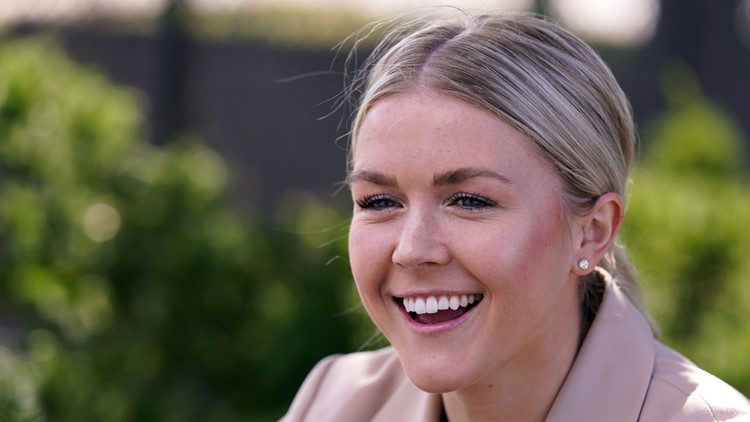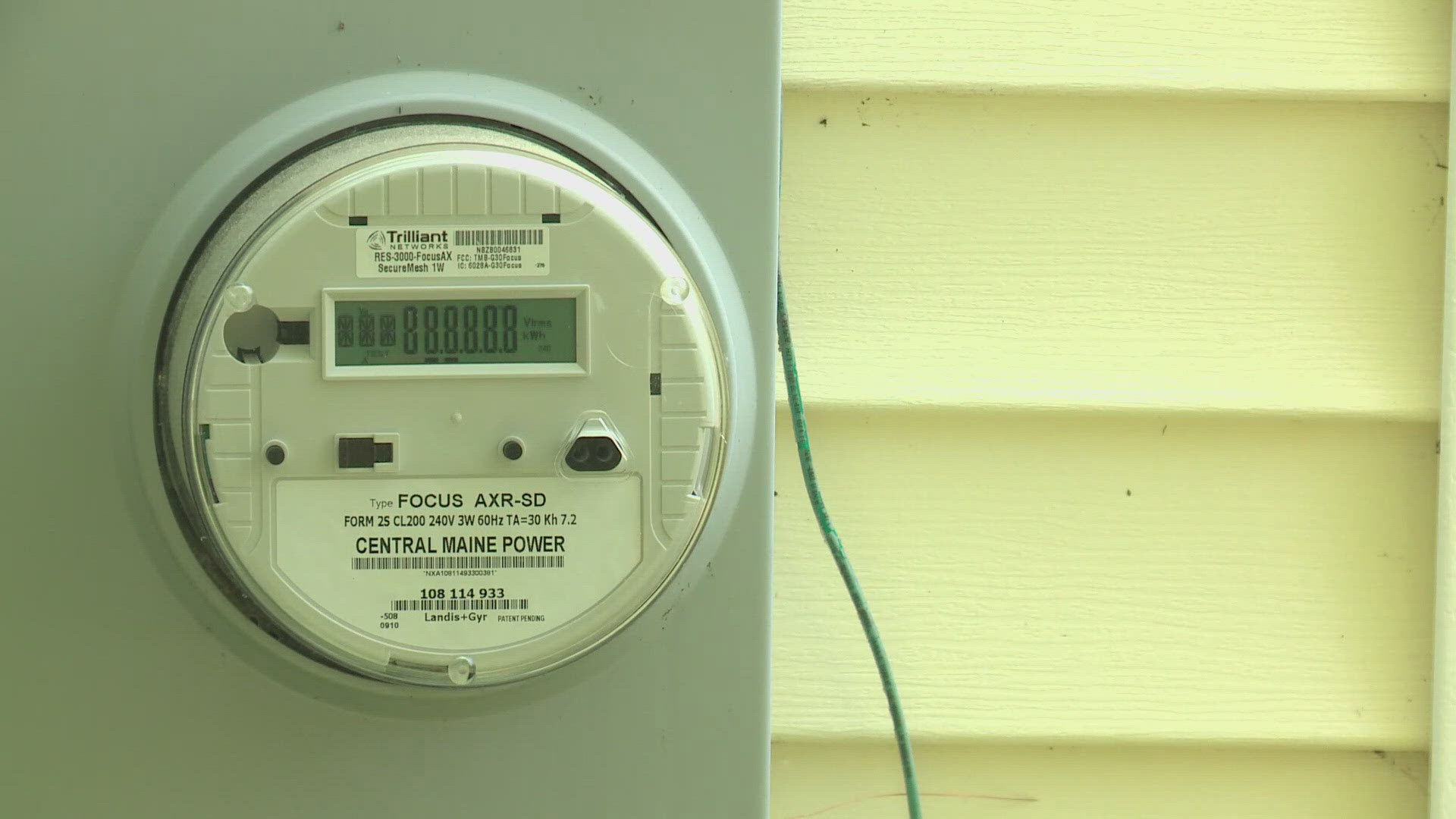MANCHESTER, N.H. — Karoline Leavitt recalls being in her New Hampshire college dining hall in 2018, filling out an application for a White House intern job while her friends were tailgating at a football game.
“I remember thinking, ‘If I made this opportunity, it’s worth missing any football game in the world,’” she told The Associated Press in an interview.
She got the job. That eventually led to a position in President Donald Trump’s White House press office, then another as communications director for Rep. Elise Stefanik, R-N.Y.
Inspired by Stefanik, the youngest woman elected to Congress when she won in 2014 at age 30, Leavitt is now running for a House seat of her own. At age 25, she could make history on Election Day, Nov. 8: Rep. Alexandria Ocasio-Cortez, D-N.Y., won at 29 in 2018.
Leavitt, an unabashed pro-Trump Republican, would also be the youngest person in the next session of Congress if she were to defeat two-term Democratic Rep. Chris Pappas in one of the most competitive races this year. Leavitt is seven months younger then fellow Gen Z candidate Maxwell Alejandro Frost, a Florida Democrat favored in his race.
The New Hampshire contest will test the appeal of a far-right candidate in a Democratic-leaning state in a midterm election that historically has served as a referendum on the current president.
The 1st Congressional District has a history of switching between parties. It flipped five times in seven elections before Pappas, now 42, won the open seat in 2018. The district includes Manchester, the state’s most populous city, Portsmouth on the Seacoast and rural communities farther north.
Leavitt won her 10-way Republican primary in September in part by going to the right of the other candidates, including Matt Mowers, the party's 2020 nominee. Mowers also worked in the Trump administration and has said he believed there were voting irregularities in the 2020 presidential election won by Democrat Joe Biden.
“I consistently continue to be the only candidate in this race who says that I believe the 2020 election was undoubtedly stolen from President Trump," Leavitt said during a debate a week before the primary.
Numerous federal and local election officials of both parties, a long list of courts, top former campaign staffers and even Trump’s own attorney general have said there is no evidence of that. Trump recently endorsed Leavitt, calling her “fantastic.”
“Matt Mowers had solid Trump credentials,” said Dante Scala, a University of New Hampshire professor of political science. “And yet she managed to out-Trump him … and that meant also expressing a lie about a stolen election without reservation.”
Pappas called Leavitt extreme and said her claims about the 2020 election “are not based in truth or reality” and are “dangerous.” Leavitt contends that Pappas and House Speaker Nancy Pelosi, D-Calif., “are the real extremists,” citing their support for a federal elections bill named after the late Rep. John Lewis, D-Ga., that would have created national automatic voter registration, allowed all voters to cast ballots by mail and weakened voter ID laws, among other things.
Leavitt has been campaigning for stronger parental rights in schools and increased domestic energy production. She has the endorsement of Republican Gov. Chris Sununu, a moderate who backed Trump’s reelection bid.
“Washington is broken, and it won’t get fixed if we keep sending the same people back there,” said Sununu, who lives in the 1st District. “Karoline Leavitt is the new voice and principled vote New Hampshire needs in Congress.”
Pappas and Leavitt have little in common beyond backgrounds in family small businesses — his at a restaurant known for its ice cream, hers working at an ice cream stand and at a used truck and car dealership.
The two have sparred over inflation, the future of Social Security and abortion.
Leavitt contends that the Inflation Reduction Act, which Pappas voted for, will actually increase inflation at a time when families are struggling.
Pappas notes that the new law has capped out-of-pocket costs for older adults on Medicare and provides energy rebates for businesses and families. He said it is fully paid for, will lower energy and health costs costs, and will reduce the deficit by $1.9 trillion over 20 years.
On Social Security, Pappas has accused Leavitt of wanting to privatize it “and gamble it on the stock market.” Leavitt said she would work to protect the benefits of anyone who has paid into the system and is open to “alternative solutions that will ensure a better future for your children and grandchildren.” She said Pappas wants to raise taxes on high earners to continue supporting Social Security.
On abortion, Pappas said he would support the Women’s Health Protection Act, which would protect the right to access abortion care nationwide after the overturning of Roe v. Wade.
Leavitt pledged on her campaign website to be a “fearless pro-life advocate” if elected to Congress. She said she supports having state legislatures make decisions on abortion regulations and would oppose a federal abortion ban.
As a contrast to Leavitt, who has never held elected office, Pappas notes his bipartisan record in Congress and his “People Over Party” coalition of supporters that include Republicans, former Republicans and independents.
“Her professional background is as Donald Trump’s spin doctor in the White House," Pappas said. "She’s never worked with Democrats on anything.”
Kathleen Sullivan, former chair of the New Hampshire Democratic Party, wrote in a column in the New Hampshire Union Leader that “it is difficult to see Leavitt working with Democrats in the way that Pappas has worked with Republicans." She cited Leavitt's references to Democrats as “radical, power-hungry socialists” and previous comments that climate change is “a manufactured crisis” created by the Democrats.
Leavitt says her experience working in the White House prepared her well for Congress, with the West Wing “perhaps one of the most fast paced, high pressure work environments there is.”
She says her youth would be an advantage in Congress.
“There’s people on both sides of the aisle that have been down there literally twice as long as I have been alive,” said Leavitt, who campaigned at college campuses, including her alma mater, Saint Anselm College in Manchester. “That’s a problem for our republic. That’s a problem for your young voters who really want a voice.”
Stefanik, now the third-ranking Republican in the House, endorsed Leavitt early on, calling her a “rising star in the Republican Party who will carry the torch of conservative values for generations to come.” Leavitt credits Stefanik with encouraging her to mount a campaign.
“Nobody told her she was going to win, but she believed in herself,” Leavitt said. “That was very inspiring to me. And I thought, ‘Why can’t I do that from my own home district?’”



